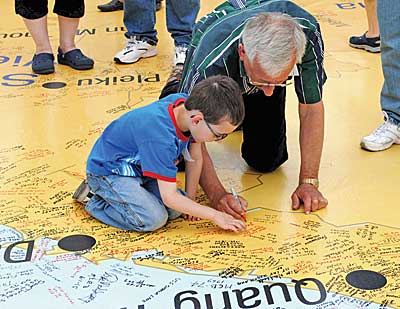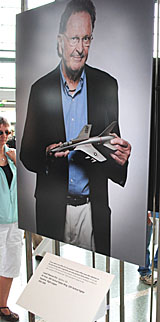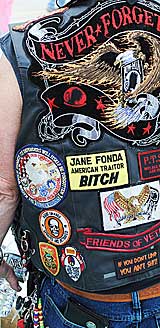During evening ceremonies and performances May 22, more than 1,200 empty chairs stood on the field in Green Bay, one for each Wisconsin participant killed or missing in the Vietnam era. (Photos: Dru Sefton, Current.)
LZ morphed from doc to project to movement
Veterans made it pubTV’s largest single outreach event
Wisconsin Public Television’s LZ Lambeau “welcome home” outreach for Vietnam veterans and their supporters last month was judged so successful that pubcasters in Texas, Oklahoma and Michigan are planning similar tributes to service members. The National Center for Community Engagement has scheduled a webinar June 23, and soon there’ll be a CPB-funded LZ toolkit
For the Wisconsin network’s three-day event, May 21-23, some 70,000 vets and supporters reported to the landing zone, Lambeau Field, home field of the Green Bay Packers.
WGVU in Grand Rapids, Mich., has already scheduled LZ Michigan for July 3. “It’s a perfect fit for local stations, to get us into the community,” said Timothy Eernisse, development manager. “We’ve already had people on our Facebook page e-mailing from Ohio and Illinois — regular people off the street, asking how to reach their stations to help plan something like this. It’s struck a chord.”
Oklahoma’s OETA network and San Antonio’s KLRN are talking with state officials about Vietnam veteran events in July and in the fall, respectively.
WPT presented the event as the civic welcome-home that many vets of the controversial war never got in the 1970s.
Veteran Jeff Wood of Milwaukee summed up the experience for many vets in his comments to the Appleton (Wis.) Post-Crescent: “I’ve seen guys crying, laughing — it’s remarkable. What’s never been there before is the recognition. People come up and shake your hand, tell you thanks. It means a lot, even if it took 41 years.”
During the planning process, LZ Lambeau Executive Director Don Jones stressed that the event had no political agenda except to thank vets and their families and raise awareness of the importance of their service. But a local chapter of the Vietnam Veterans for Peace national antiwar group called the event “militaristic” and sponsored its own workshops on veterans’ reintegration issues at venues around town. One protester from the group was spotted on site.
LZ Lambeau kicked off with an Honor Ride on Friday, May 21. One motorcyclist for each Wisconsinite killed or missing in the conflict — 1,244 bikers — thundered in from La Crosse, 210 miles to the southwest. The climax came Saturday evening with a solemn ceremony that drew 26,000.
During the weekend, the stadium’s light-filled atrium housed Vietnam-era exhibits, including a tribute to Canadians who enlisted and died with American forces, walls of obituary clippings and a display of portrait photos of vets who appear in the WPT documentary. Upstairs, there were workshops and seminars such as “Wisconsin Women in the Vietnam War,” and the reading of a play, “The Tragedy of Achilles in Vietnam.” Across the street was the “Moving Wall,” a half-size replica of the Vietnam Veterans Memorial in Washington built by the nonprofit Vietnam Combat Veterans Ltd., which has been touring the country for more than 20 years. Nearly filling the vast parking lot were vintage military vehicles and aircraft, a performance stage and booths.
One especially popular stop was a 140-by-105 foot vinyl map of Southeast Asia where vets could jot notes about their experiences. The map was later presented to the Wisconsin Veterans Museum. “They now consider it to be an artifact,” said Kathy Bissen, WPT’s production director. “They . . . don’t intend for anybody to write on it ever again. It is an artifact of LZ Lambeau.”
Making amends
WPT has been working on its Wisconsin Vietnam War Stories outreach for more than two years in cooperation with the state Department of Veterans Affairs, the Wisconsin Historical Society, the Packers, Brown County, and more than two dozen vets’ organizations. Originally the project included documentary screenings, a companion book, high-school curricular material, and a statewide “talking tour” that would bring together vets for reminiscence and possibly some healing.
The idea for the additional LZ gathering grew out of interviews with veterans for the three-hour doc about veterans’ experiences and feelings during the war and after (Current, July 7, 2009). WPT aired the doc on May 24 and 25, right after the weekend event. The network also produced the evening ceremony for broadcast May 26.
“War Stories” producer Mik Derks and videographer Everett “Butch” Soetenga — himself a Vietnam vet — previously collaborated on WPT docs about veterans of World War II and the Korean War. During their work for this film, the two noticed that these vets typically felt more intense anxiety, pain and loss than the troops of earlier wars, in large part because many got a hostile reception when they returned stateside. Vietnam vets deserved something special, Derks and Soetenga decided — a real welcome home. At a place special to Wisconsinites: Lambeau Field.
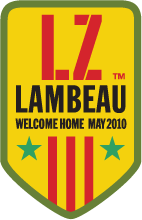 Don Jones, a vet interviewed for the WPT documentary, came out of retirement to sign on as executive director of LZ Lambeau on a one-year contract in June 2009. After serving in Army air intelligence in Saigon and Danang, he had worked as an event planner, pulling together sizeable events such as state political conventions. Jones’s skill set proved invaluable, Bissen said. “It’s a very delicate situation, knowing the right things to do” to maneuver through the complexities of veterans’ issues, agencies and the persistent pain of many individuals.
Don Jones, a vet interviewed for the WPT documentary, came out of retirement to sign on as executive director of LZ Lambeau on a one-year contract in June 2009. After serving in Army air intelligence in Saigon and Danang, he had worked as an event planner, pulling together sizeable events such as state political conventions. Jones’s skill set proved invaluable, Bissen said. “It’s a very delicate situation, knowing the right things to do” to maneuver through the complexities of veterans’ issues, agencies and the persistent pain of many individuals.
Jones said he worked closely with a group of 60 to 80 vets known at WPT as “the Allies” who met quarterly for two years “to provide feedback on the concept and, ultimately, form the core of the committees that did the key work on LZ Lambeau.” Another important task was to ensure that the way the event was presented “rang true to a veteran’s ear.” Jones also strived to, as he said, “interpret veteran and civilian viewpoints to each other.”
WPT is still tallying up the final price tag, Bissen said. The umbrella project cost about $1.7 million, which covers travel costs for the portrait exhibit still circulating through galleries and museums statewide. LZ Lambeau cost about $1 million of the total. That covered security, promotion and advertising, the website, rentals — even fuel to fly in Vietnam-era aircraft.
“Donations more than covered LZ Lambeau, which was our original intent,” Bissen said. “We had more than 800 volunteers on the grounds throughout the course of the weekend. Some of the contractors gave us nonprofit rates and others cut their rates even beyond that because they so much wanted to be a part of this project.”
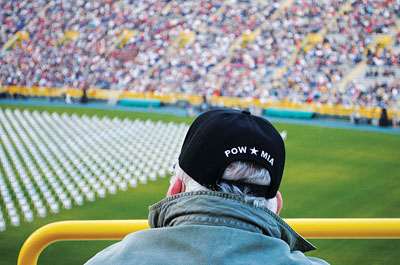
During evening ceremonies and performances May 22, more than 1,200 empty chairs stood on the field in Green Bay, one for each Wisconsin vet killed or missing during the Vietnam era. (Photos: Dru Sefton, Current.)
The doc is being re-edited to remove Wisconsin references and offered to other stations. So far, six commercial stations and nine PBS affiliates have requested the film. This fall a condensed, stand-alone version of the doc will be offered for national distribution.
Grand Rapids outpouring
Other stations inspired to hold veterans’ events are scaling their projects to fit available resources. In Grand Rapids, WGVU is partnering with its licensee, Grand Valley State University, and the minor-league West Michigan Whitecaps baseball team. WGVU will use the team’s 11,000-seat stadium for July 3 ceremonies.
Eernisse said he thought LZ Lambeau was a great idea when he heard about it in October 2009. “We called Jon [Miskowski, WPT development director] and said, ‘We want to do something like this, do you mind?’ He said, ‘We’d be honored.’ And it just blossomed from there.”
The Grand Rapids station began organizing its event in January, with an e-mail to hundreds of volunteers who had worked on the station’s Carrier outreach in 2008. “We just said, you need to come to the studios at this date and time to see what our next big project will be,” Eernisse said.
They had no clue what they were coming for.” About 125 persons showed up, gave an enthusiastic reaction to the LZ concept and immediately divided into five committees to tackle the work — “all but one led by someone from the community,” he noted. Since then, monthly meetings have had an average turnout of 100 volunteers. “We could spend tons of station time and resources doing it ourselves, but we’re instead using the event to engage the community. They’re the ones rolling with it.”
Charles Meyer, executive director of the National Center for Media Engagement, told Current via e-mail that the mention of similar events in other communities has something of a magnetic effect. “Stations tell us that as they engage their community more deeply, the community starts reaching out to engage the station,” he said, “and that’s a great sign that the community sees the station as a relevant convener and collaborator in civic life.” WPT staffers will discuss their project during NCME’s June 23 webinar.
Soon after WPT announced plans for LZ Lambeau in January, WGVU unveiled its plans for LZ Michigan. At the press conference, four Vietnam veterans spoke movingly about their tours of duty and continuing emotional struggles. “Afterward, one of the wives was sobbing,” Eernisse said. “I said to her, ‘Are you okay?’ She said, ‘I’ve been married to him for 30 years, and what he just said, I never knew.’”
Eernisse said the Grand Rapids event originally was centered on a Saturday evening show at the ballpark, with speakers, music, displays, clips from an edited version of WPT’s “Vietnam War Stories” (which WGVU will later broadcast) and fireworks.
Plans now cover multiple venues and activities, including a Michigan Patriot Guard Riders motorcycle rally; the Moving Wall; a lecture and exhibits at the Gerald Ford Presidential Library and Museum; and historians audio-taping veterans’ memories. Clinical psychologists also will be on hand in case anyone wants their help.
Vietnamese Americans who live the area will participate as well, including members of the Vietnamese Veterans of America. There will be a speech by the director of the city’s multicultural affairs office, whose family fled Saigon after the war.
“One of the interesting things we found out working on this is, one of the largest communities of Asian-Americans is in western Michigan and 40 percent are Vietnamese,” Eernisse said. “So we’ve translated all the promos into Vietnamese.”
In San Antonio — nicknamed “Military City” for several nearby bases — KLRN’s President Bill Moll has began talks with potential partners for an LZ event in the fall. “It’s an ambitious plan we’re just starting to develop,” he told Current. Moll is immediate past chair of the USO World Board of Governors, so he hopes to pull in that organization.
He’s also talking with the Texas Association of Public Broadcasters. “We have over 400 general-grade officers retired here, and tens of thousands of others. There are a lot of Vietnam-era vets. So I think it would be hugely successful.”
Pubcasters don’t have to make a big splash to pay tribute to the vets. “We encourage stations interested in the LZ Lambeau model to scale and shape approaches that are appropriate for their situation and the communities they serve,” said NCME’s Meyer. Also, outside help is invaluable. Many LZ Lambeau components “were led or heavily assisted by organizations that partnered with WPT to make the initiative a success,” he said.
Oklahoma’s OETA network, which won an Emmy for its outreach project, “Oklahoma World War II Stories,” linked with Ken Burns’ The War in 2007, is talking with Gov. Brad Henry’s office to partner-up for “Operation Oklahoma: A Salute to Vietnam Veterans” July 2-4 in three locales —Tulsa, Bricktown and Norman.
Looming state budget cuts prevent the state-owned network from producing an entire event, said station spokeswoman Ashley Barcum. The network has already invested in “My War,” a one-hour special on Oklahoma’s Vietnam veterans, which premieres this month and would be screened at Operation Oklahoma sites.
This month’s NCME peer webinar is the first step to getting even more stations involved in similar efforts. “In public media, we’re usually good at sharing the explicit — the tangible “how to’s” of concrete projects,” Meyer said. “We’re focusing on getting better at identifying the implicit parts of a project — the intangible knowledge and understanding required to engage communities authentically. Those concepts are often universal and can be applied across concrete projects and initiatives. That’s the kind of knowledge that can transform a station and help ensure the station remains a critical part of community life.”
Advice from an event planner who’s been there
Thinking about creating an “LZ” veterans’ homecoming in your community? Here are tips from LZ Lambeau Executive Director Don Jones, himself a Vietnam vet:
- Contact veterans’ groups early. WPT coordinated with nearly two dozen, including the Veterans of Foreign Wars, Wisconsin Gold Star Families and Disabled American Veterans.
- “On a very practical note,” Jones said, “file well ahead of the event for all permits and licenses.”
- Also start talking early with the chamber of commerce and the local convention and visitors bureau.
- Senior police, fire and EMS officers can be doubly valuable contacts, because they’re often Vietnam-era vets.
- Be sure to include Desert Storm, Iraq and Afghanistan veterans. “They have a bond with those who served in Vietnam,” Jones said.
- Involve federal veterans’ centers (such as VA hospitals) and especially counselors, who may be in contact with vets not connected to established groups.
- Reach out to as many registered nurses, USO and Red Cross workers who had important roles in-country, and encourage them to attend.
- Contact county and tribal veterans’ services officers, if there are any near you.
- Involve local museums, libraries, schools and colleges.
- Promote through branches of service organizations such as Rotary, Lions, Kiwanis and Moose.
- “Make very sure your promotions invite not only Vietnam veterans but also Vietnam era veterans, families, friends and other supporters,” Jones said.
“The event might be seen as a reunion for veterans only. But one important LZ Lambeau goal was to facilitate conversations among vets, their family and friends.”
Comments, tips, questions?
Web page posted June 8, 2010
Copyright 2010 by Current LLC
